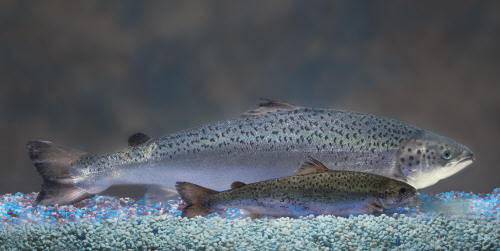WASHINGTON — The Food and Drug Administration is poised to approve the first genetically modified animal for human consumption, a highly anticipated decision that is stirring controversy and could mark a turning point in the way American food is produced.
FDA scientists gave a boost last week to the Massachusetts company that wants federal approval to market a genetically engineered salmon, declaring that the altered salmon is safe to eat and does not pose a threat to the environment.
“Food from AquAdvantage Salmon is as safe to eat as food from other Atlantic salmon,” the FDA staff wrote in a briefing document.
Those findings will be presented Sept. 19 to a panel of scientific experts that will advise top officials at the FDA whether to approve the altered salmon. The panel is holding two days of meetings to hear from FDA staff members, the company behind AquAdvantage and the public.
AquAdvantage is an Atlantic salmon that has been given a gene from the ocean pout, an eel-like fish, which allows the salmon to grow twice as fast as a traditional Atlantic salmon.
It also contains a growth hormone from a Chinook salmon.
AquaBounty, the Massachusetts company that first applied to the FDA for permission to sell its fish in 1995, said the modified fish is identical to the Atlantic salmon, except for the speed of its growth.
“We’ve been studying this fish for more than 10 years,” said Ronald Stotish, the company’s president and chief executive. “In characteristics, physiology, behavior, this is an Atlantic salmon. It looks like an Atlantic salmon. It tastes like an Atlantic salmon.”
The scientists at the FDA that reviewed AquaBounty’s application seem to agree.
But independent scientists, consumer groups and environmental organizations are concerned about both the pending decision and the process the FDA uses to determine whether the genetically modified fish is safe for human health and the environment.
The agency is evaluating the fish as if it were a new veterinary drug, which means that the FDA’s deliberations are behind closed doors and that AquaBounty can claim that much of the research and other supporting data it supplies to the FDA are confidential.
“Critical information about the whole process has been kept from the public and organizations that focus on these issues,” said Wenonah Hauter, executive director of Food and Water Watch, part of a coalition of 31 organizations and restaurant chefs demanding that the FDA deny approval of the altered fish. “There’s a transparency problem.”
Siobhan DeLancey, an FDA spokeswoman, said the agency is following rules. “We do have obligations under the regulations to protect company confidential information,” she said.
Consumer groups and environmental organizations are particularly concerned that AquAdvantage salmon could escape fish farms to threaten the wild salmon population, which is severely endangered, Hauter said.
Anne Kapuscinski, a professor at Dartmouth College and an expert on the safety of genetically modified organisms, said she is uncertain how well the FDA is able to assess the risks to the natural world that may be posed by an organism created in a laboratory.
“If you put the top scientific researchers in this area into a room, they would have to work very hard together to figure out the conclusion for ecological risk,” Kapuscinski said. “This is very, very complex.”
The pending decision is being tracked by biotechnology companies that have invested millions of dollars in developing genetically modified animals for food and are waiting for FDA approval.
Copy the Story Link
Send questions/comments to the editors.



Success. Please wait for the page to reload. If the page does not reload within 5 seconds, please refresh the page.
Enter your email and password to access comments.
Hi, to comment on stories you must . This profile is in addition to your subscription and website login.
Already have a commenting profile? .
Invalid username/password.
Please check your email to confirm and complete your registration.
Only subscribers are eligible to post comments. Please subscribe or login first for digital access. Here’s why.
Use the form below to reset your password. When you've submitted your account email, we will send an email with a reset code.